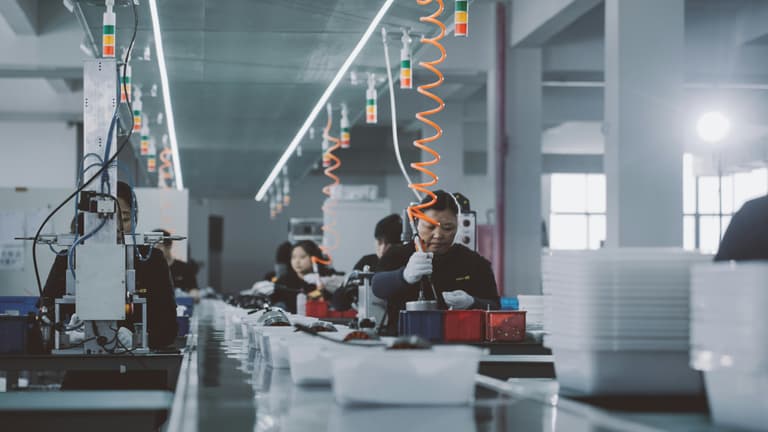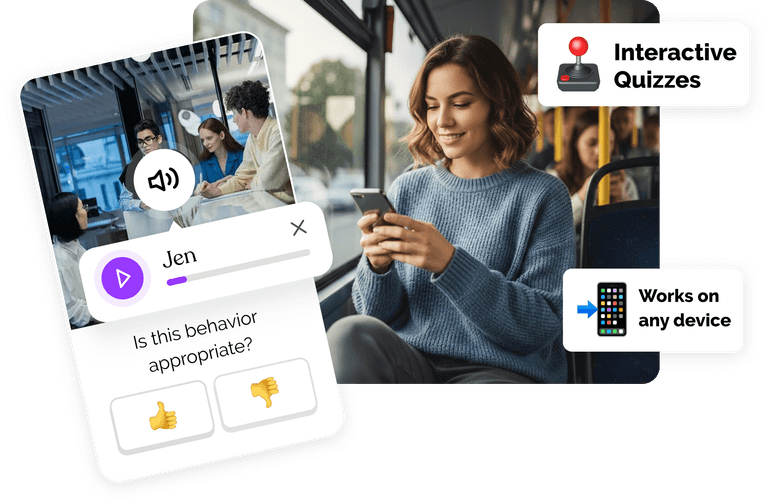Types Of Human Trafficking Companies Should Be Aware Of


Human trafficking is, unfortunately, neither a thing of the past nor something that only happens in some mythical land far, far away. It is a 150 billion-dollar industry perpetuating modern-day slavery, with the USA being a top destination country and host to quite a bit of it.
This article walks you through the definitions and types of human trafficking, and provides you with a solution for keeping your own business and employees free and safe from this heinous violation of human rights — and the legal liabilities that come in tow.
Defining Human Trafficking
Human trafficking is a global problem requiring global solutions but here, we will focus on two legal definitions of this crime: by the United Nations and by the United States government.
The United Nations' Definition Of "Trafficking In Persons"
According to Article 3 of UN TIP Protocol — a.k.a. the "Protocol to Prevent, Suppress and Punish Trafficking in Persons, Especially Women and Children" (which is part of the United Nations Convention against Transnational Organized Crime):
_'Trafficking in persons' shall mean the recruitment, transportation, transfer, harboring or receipt of person, by means of the threat or use of force or other forms of coercion, of abduction, of fraud, of deception, of the abuse of power or of a position of vulnerability or of the giving or receiving of payments of benefits to achieve the consent of a person having control over another person, for the purpose of exploitation. Exploitation shall include, at a minimum, the exploitation of the prostitution of others or other forms of sexual exploitation, forced labor or services, slavery or practices similar to slavery, servitude or the removal of organs.
The US Department Of Justice Definition Of Human Trafficking
The United States government provides a similar definition of "human trafficking" in the Trafficking Victims Protection Act of 2000 (TVPA), as written in the United States Code, 2006 Edition, Supplement 4, Title 22):
a) Sex trafficking in which commercial sex act is induced by force, fraud, or coercion, or in which the person induced to perform such act has not attained 18 years of age; or
b) The recruitment, harboring, transportation, provision, or obtaining of a person for labor or services, through the use of force, fraud, or coercion for the purpose of subjection to involuntary servitude, peonage, debt bondage, or slavery.
To be clear: a child put to work for any kind of sexual activity is automatically considered a sex trafficking victim, even if it is claimed that "force, fraud, or coercion" were not a factor in the child's sexual exploitation.
Legal Repercussions
The TVPA allows for civil lawsuits to be brought up against businesses who benefit from human trafficking in some way. A company is liable even if it did not directly engage in human trafficking, but still in some way accommodated (and hence proliferated) human trafficking while turning a profit (e.g. hotels that are favored by sex traffickers that turn a blind eye to the systematic criminal exploitation that happens on their premises).
Forms Of Human Trafficking
Aside from illicit organ harvesting and trafficking, most types of human trafficking fall within two broad categories of forced sex trafficking and forced labor trafficking.
Sex Trafficking
Sex trafficking cases make up a large part of human trafficking in the US and the bulk of global demand (with 80% being child and adult female victims). Much of the illicit sex trade takes place within the commercial sex industry which extends to the following exploitative sub-sectors.
Escort Services
In the US, prostitution is illegal while escort services are legal: sex traffickers and pimps exploit this ambiguity and conduct illegal dealings involving trafficking victims under legal pretenses.
Illicit Massage Parlors
Late-night massage parlors/spas/salons are notorious for not only offering illegal sexual services, but human trafficking in massage parlors is common. Often using indentured foreign laborers and sex slaves to administer them.
Pornography
Pornography makes a fertile ground for sex trafficking and online sexual exploitation, as pornographers are known to use coercive and abusive tactics to pressure individuals into performing sexual acts they sell for profit. Owing to the barely-regulated websites, pornographic content (including child pornography) obtained by exploitative means is distributed alongside professional/consensual materials — and the consumer does not know the difference.
Brothels And Street Prostitution
Prostitution, which is outlawed in the US (except for in Nevada), is an illicit trade closely tied to organized criminal networks and the illegal drug trade. Needless to say, sex trafficking cases abound in the commercial sex trade in the US, as most of it happens "underground" and "off the books".
Forced Marriage
A forced marriage takes place when both parties did not consent to being married. A "child marriage" is a type of forced marriage, where at least one of the spouses is underage. Forced marriage disproportionately affects girls and women (particularly in some nations in South Asia and Sub-Saharan Africa, where child marriage is part of old traditions, although the United States also has communities where child marriages continue to be arranged.)
Child Sex Trafficking and Sex Tourism
Child sex tourism involves adult individuals traveling abroad — typically to developing countries stricken by poverty, corruption and a lack of protections for children — to engage in unlawful sexual acts with minors of all genders.
Forced Labor
The UN's International Labor Organization (ILO) estimates forced labor in the private sector at 16 million victims, with an additional 4 million cases of forced labor sanctioned by the state.
Involuntary Domestic Servitude
Involuntary servitude in the US domestic sector is an open secret: domestic workers are known to be among the most abused of laborers in any market. A domestic worker's situation becomes exploitative when their movement becomes restricted/confined to the property, their identification and travel documents taken away, and their pay "docked" for room, board, and travel expenses. Domestic workers can be subject to sexual abuse and emotional abuse without anyone finding out, as it all happens behind the closed doors of private homes.
Bonded Labor
Debt bondage is when a person is trapped into working off a debt (recruitment fees or the above-mentioned "travel fees"). Bonded laborers are unable to dig themselves out of the debt as additional costs for their "keeping" charged by the unscrupulous "employer" snowball faster than their meagre earnings.
Forced Child Labor
Horrifically, children are exploited in everything from commercial sex acts to being obligated to labor in sweatshops, often in hazardous work conditions. Industries most guilty of child labor trafficking include:
- manufacturing
- mining & quarrying
- agriculture
- domestic service
- hotels
- restaurants
- online child abuse materials
Child Soldiers
Additionally, many children (as young as 7-8 years old) are kidnapped into militias, to be used as child soldiers, as well as cooks, guards, messengers, spies, and servants to crime/war lords engaged in armed conflicts. Sexual abuse is prevalent against child soldiers of all genders and they are often forced to commit atrocities against their families and communities.
"Human Trafficking" Vs. "Human Smuggling"
Human trafficking does not require the transportation of the victims across local, state, or international borders, whereas human smuggling involves illegally moving victims from place to place (often in extremely unsafe ways), as well as furnishing some victims with fraudulent paperwork.
Human smuggling is an illegal service for individuals who are trying to to get from point A to point B, but cannot achieve it via legitimate means. It starts off as a voluntary endeavor, with violence-fleeing refugees or migrant workers looking for jobs arranging and paying to be transported to their intended destination in some illegal fashion. Too often, however, human smuggling leads to human trafficking "on the other side of the fence" -- where illegal immigrants and laborers without familiar connections or anyone to advocate for them become seized by sex and labor traffickers into servitude with no one to rescue them. Because these victims "don't exist on paper", experience potential language barriers, and are typically terrified of immigration authorities, they are among the easiest targets for being kidnapped or trapped into an exploitative situation by traffickers.
Who Is Vulnerable To Human Trafficking?
As you can see, many cases of sex trafficking and labor trafficking start with a migration in search of economic opportunities for a better life. In general, populations most in danger of being exploited, trafficked, and smuggled come out of areas and situations marked by economic disadvantage, a lack of opportunity for upward mobility, a lack of human rights protections, and an environment of crime and corruption. People who are dead-ended and desperate are easier to coerce into exploitation with false promises of a brighter future than those who feel some control over their lives.
Women, minors, ethnic minorities, LGBTQ+ people immigrants, persons with disabilities, and victims of domestic abuse are all target groups, though human trafficking can happen to anyone.
It is also worth noting that trafficking is not always committed by a stranger: victims are frequently trafficked by persons they already know (which includes family and romantic partners), and this is overwhelmingly the case when it comes to trafficked children.
Help Prevent Human Trafficking At Your Company
Although anti-human trafficking training has not (yet!) been made mandatory, companies are still legally liable for benefitting from labor trafficking and sex trafficking — directly or indirectly — which can take the form of exploiting their own employees as well as associating with problematic businesses (like "sweatshops"). It is also best to know the different stages of human trafficking.
Extra hard-hit industries — such as the hospitality sector, which is actively abused by sex traffickers, or the construction & landscaping sector that is rife with forced labor and bonded labor cases — have to actively fight the trafficking element in their midst if they don't want to become complicit in its criminal activity.
Discover more about the impact human trafficking has on the economy.
EasyLlama To The Rescue
Educating both the workforce and the leadership of the company on the definitions and tell-tale signs of potential human trafficking situations is vital to preventing this hideous violation of human rights from having any chance of materializing in the first place.
EasyLlama's got you with its smart and simple anti-trafficking training! Its mobile-optimized e-program will quickly educate your employees and supervisors on the "heavy" but necessary-to-understand topic of human trafficking — and empower them to make sure that this hideous incarnation of modern slavery does not happen on their watch!





